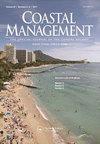Utilizing an End-User Driven Process to Identify and Address Climate-Resilience Tool Needs in the U.S. Gulf of Mexico
IF 1.9
4区 环境科学与生态学
Q4 ENVIRONMENTAL SCIENCES
引用次数: 1
Abstract
Abstract Many tools have been generated in recent decades to support decision-makers in understanding and acting on climate science, causing stakeholders in the Gulf of Mexico (Gulf) to repeatedly express the need for guidance when selecting climate resilience tools. The Climate and Resilience Community of Practice (CoP), Gulf of Mexico Alliance (GOMA), and the Northern Gulf of Mexico Sentinel Site Cooperative (Cooperative) developed and implemented an end-user driven process for tool creation. Research has suggested that integrating target end-users throughout tool development improves the probability a tool will be utilized, yet there is little practical guidance available on how to successfully design and implement an end-user driven tool development process. In this study, an end-user driven process and results from implementing the process during tool development are presented. Challenges, successful approaches, and lessons learned to support future tool development, especially for tools focused on sharing climate science are identified. Guidance is provided on needed expertise, timelines for engagement with target end-users, and methods on how to solicit, analyze, and assimilate end-user needs, perspectives, and priorities into a final product.利用最终用户驱动的过程来确定和解决美国墨西哥湾的气候弹性工具需求
摘要近几十年来,已经产生了许多工具来支持决策者理解气候科学并采取行动,这导致墨西哥湾的利益相关者在选择气候恢复力工具时反复表示需要指导。气候与韧性实践社区(CoP)、墨西哥湾联盟(GOMA)和墨西哥湾北部哨兵站点合作社(Cooperative)制定并实施了一个最终用户驱动的工具创建流程。研究表明,在整个工具开发过程中整合目标最终用户可以提高工具被使用的可能性,但关于如何成功设计和实施最终用户驱动的工具开发过程,几乎没有实际指导。在本研究中,介绍了一个最终用户驱动的过程以及在工具开发过程中实施该过程的结果。确定了支持未来工具开发的挑战、成功的方法和经验教训,特别是针对侧重于共享气候科学的工具。提供了关于所需专业知识、与目标最终用户接触的时间表以及如何在最终产品中征求、分析和吸收最终用户需求、观点和优先事项的方法的指导。
本文章由计算机程序翻译,如有差异,请以英文原文为准。
求助全文
约1分钟内获得全文
求助全文
来源期刊

Coastal Management
环境科学-环境科学
CiteScore
6.00
自引率
0.00%
发文量
24
审稿时长
>36 weeks
期刊介绍:
Coastal Management is an international peer-reviewed, applied research journal dedicated to exploring the technical, applied ecological, legal, political, social, and policy issues relating to the use of coastal and ocean resources and environments on a global scale. The journal presents timely information on management tools and techniques as well as recent findings from research and analysis that bear directly on management and policy. Findings must be grounded in the current peer reviewed literature and relevant studies. Articles must contain a clear and relevant management component. Preference is given to studies of interest to an international readership, but case studies are accepted if conclusions are derived from acceptable evaluative methods, reference to comparable cases, and related to peer reviewed studies.
 求助内容:
求助内容: 应助结果提醒方式:
应助结果提醒方式:


